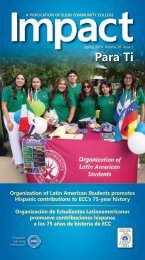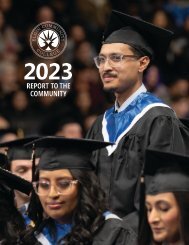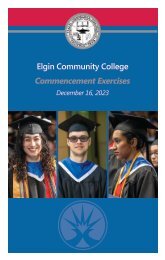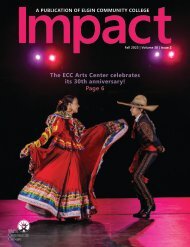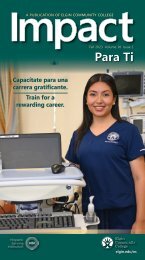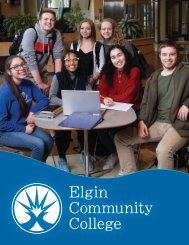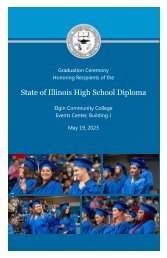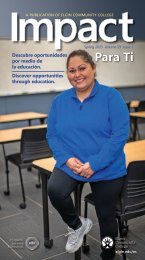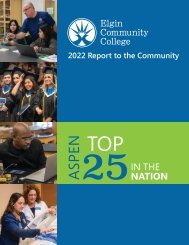ILEA Equity Plan | Elgin Community College (ECC)
There are wide and persistent gaps in college completion rates in Illinois, especially among students of color and low-income students. After an in-depth analysis of our institutional data, Elgin Community College (“ECC” or “the College” or “we” or “our”) has developed an Equity Plan containing annual growth targets for which progress updates will be shared publicly over the next five years. Our Equity Plan reflects the unique characteristics of our institution. For example, ECC is designated as a Hispanic Serving Institution by the US Department of Education, with just over 42% of the students identifying as Latinx or Hispanic. Also, the district served by ECC is widely diverse in terms of income and educational attainment. We will identify the obstacles students face and develop programs and policies that break down unnecessary college graduation barriers. Along with our fellow colleges, in the Partnership for College Completion organization, with this Illinois Equity in Attainment (“ILEA”) plan, we pledge to close the completion gaps by 2025.
There are wide and persistent gaps in college completion rates in Illinois, especially among students of color and low-income students. After an in-depth analysis of our institutional data, Elgin Community College (“ECC” or “the College” or “we” or “our”) has developed an Equity Plan containing annual growth targets for which progress updates will be shared publicly over the next five years. Our Equity Plan reflects the unique characteristics of our institution. For example, ECC is designated as a Hispanic Serving Institution by the US Department of Education, with just over 42% of the students identifying as Latinx or Hispanic. Also, the district served by ECC is widely diverse in terms of income and educational attainment. We will identify the obstacles students face and develop programs and policies that break down unnecessary college graduation barriers. Along with our fellow colleges, in the Partnership for College Completion organization, with this Illinois Equity in Attainment (“ILEA”) plan, we pledge to close the completion gaps by 2025.
Create successful ePaper yourself
Turn your PDF publications into a flip-book with our unique Google optimized e-Paper software.
The Holistic Case Management Model strategy is connected to other institutional efforts and<br />
supports <strong>ECC</strong>’s strategies in our 2018-2022 Strategic <strong>Plan</strong>. See Table 9 for specific strategies<br />
that are aligned.<br />
The Success Indicators used to demonstrate this strategy is having an impact are:<br />
• Student completion of course and programs<br />
• Student progression through coursework<br />
• Student job attainment<br />
• Transfer to subsequent educational institutions<br />
• Student engagement and satisfaction with college programs and services<br />
• Enrollment of identified target populations<br />
• Preparedness of graduates for transfer and/or employment<br />
<strong>ILEA</strong> EQUITY PLAN STRATEGY 7: TIDE: Teaching/Learning Inclusion, Diversity, and <strong>Equity</strong><br />
The TIDE Group works in conjunction with <strong>ECC</strong>’s Center for Enhancement of Teaching &<br />
Learning (“CETL”), Professional/Organizational Development, and Student Services for the<br />
purpose of building on current faculty training to highlight key challenges and concerns in<br />
promoting diversity and to illustrate ways of incorporating an understanding of cultural<br />
inclusivity in the classroom and beyond. Despite having as a priority of the overall <strong>ECC</strong> Strategic<br />
<strong>Plan</strong> to promote diversity and advance opportunities for marginalized students, achieving these<br />
goals in the day-to-day classroom is harder to accomplish. Our student body is diverse along<br />
many lines, including race, ethnicity, age, religion, and previous college experience. We also<br />
have a large contingency of non-traditional students. Too, many of our students are working<br />
parents, first-generation, full-time employees, immigrants, English-language learners, and<br />
more. All of these demographic characteristics combine into a very diverse campus, which<br />
makes the need for strong cultural competency and inclusivity paramount. The goal of this<br />
TIDE program is to assist in developing a training framework and resources aimed at preparing<br />
faculty to intentionally create culturally responsive classrooms and curriculum. This will include<br />
both internally and externally developed content. The TIDE program will move faculty beyond<br />
awareness to action: incorporating specific strategies for enhancing ones’ own cultural<br />
competence and then addressing how equity and inclusion play out in the classroom.<br />
During Fall 2019, TIDE piloted a series of introductory equity-minded pedagogy workshops with<br />
faculty in the English Department (based on scheduling availability and expressed interest). The<br />
five sessions consisted of:<br />
1. Introduction to TIDE, starting conversations, language, self-awareness, etc.<br />
2. Belongingness<br />
3. Culturally Responsive Assessment<br />
4. Culturally Responsive Syllabi<br />
5. Reflections – Focus Group<br />
The first four sessions have been approved by the CETL Advisory Committee to award CETL lane<br />
movement credit.<br />
43<br />
<strong>ILEA</strong> <strong>Equity</strong> <strong>Plan</strong><br />
Institutional Strategies







